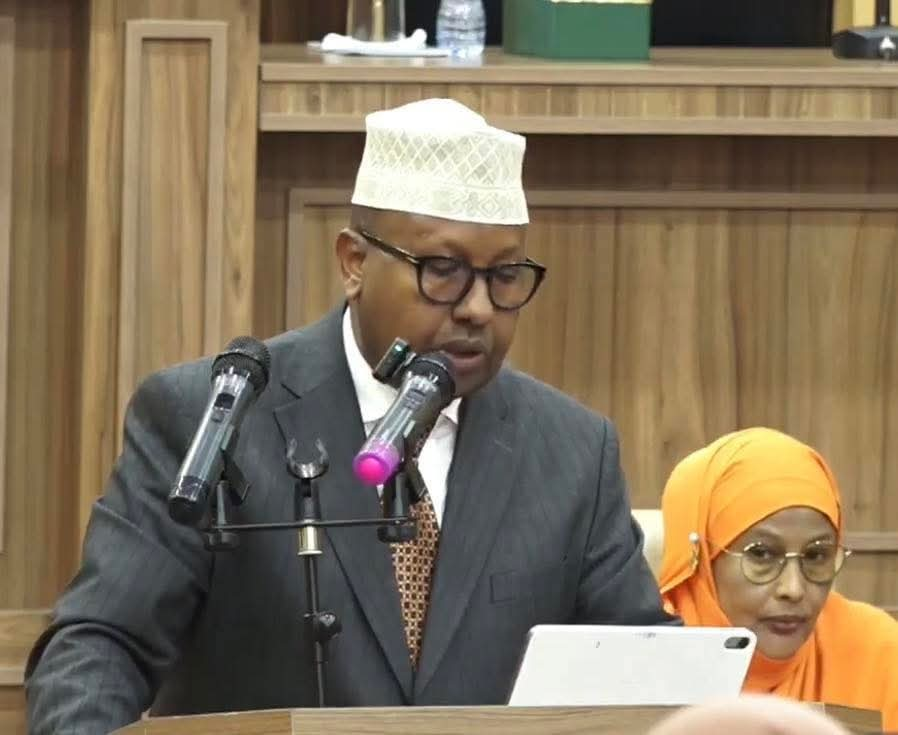Somalia’s Defence Minister Pushes for 100,000-Strong National Army as Foreign Troop Era Nears Its End

GOOBJOOG NEWS|MOGADISHU: Somalia’s Defence Minister Ahmed Moalim Fiqi has said the country’s long-term security cannot rely on foreign troops, calling instead for the creation of a 100,000-strong national army capable of defending Somalia’s sovereignty and defeating Al-Shabaab.
Speaking before the Upper House of Parliament on Wednesday, Fiqi argued that as long as external forces remain in the country—“legally or illegally”—Somalia’s security will remain incomplete. His remarks come as the African Union Support and Stabilisation Mission in Somalia (AUSSOM), which replaced the African Union Transition Mission in Somalia (ATMIS) on January 1, 2025 continues its first year of operations under a 12-month mandate endorsed by the UN Security Council.
The AUSSOM mission was established through UN Security Council Resolution 2767 (2024) following the end of ATMIS’s mandate on 31 December 2024. It was created to prevent a security vacuum during Somalia’s transition to full national security responsibility. But Fiqi appeared to downplay the importance of the new mission, suggesting that changing the name of a foreign presence was no substitute for building national capacity. “Real security will only come when Somali soldiers, not foreign ones, are responsible for protecting our people and borders,” the minister said.
A New Security Vision
Fiqi outlined an ambitious plan to grow the Somali National Army (SNA) to 100,000 personnel—more than double the current estimated force of 30,000–40,000. The expanded army, he said, would be equipped and trained to defeat Al-Shabaab, secure borders on land and sea, and guarantee lasting peace.
The minister framed this as part of a broader effort to achieve “sovereign independence in security,” a key priority of President Hassan Sheikh Mohamud’s administration, which has made military reform central to its campaign against Al-Shabaab.
Funding and Political Challenges
Despite the optimism, the plan faces steep obstacles. In the 2025 national budget, the Ministry of Defence received $171 million—about 13% of total spending. Analysts note that such a figure falls far short of what would be needed to recruit, train, and equip a professional army of 100,000 soldiers.
Fiqi acknowledged that corruption and the problem of “ghost soldiers” remain a serious threat to progress, warning that every dollar “must reach the front line” if reform is to succeed.
Political divisions also loom large. Clan-based rivalries and fragmented command structures have long hindered the creation of a unified army. The minister called for national consensus to ensure that the future force serves Somalia as a whole, not individual factions.
The Road Ahead
AUSSOM’s initial mandate runs through December 2025, with a long-term plan for Somali forces to assume full security responsibility by 2029. The mission’s 12,626 authorised personnel will continue to provide training and logistical support as Somalia works to expand and unify its armed forces.
However, training remains uneven, as Somali troops are instructed by various foreign partners—including Turkey, the United States, the United Kingdom, and the United Arab Emirates—each using different curricula.
Fiqi’s message to Parliament was clear: while external partners remain welcome in a supportive role, the ultimate goal is a self-sufficient Somali military.
“Our independence will only be complete when we can defend ourselves,” he said.
The speech marks a defining moment in Somalia’s security transition—one that tests whether the country can move from dependence on international missions to building a national army that embodies unity, professionalism, and lasting sovereignty.